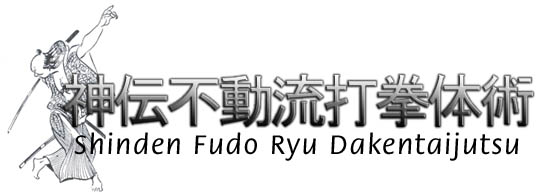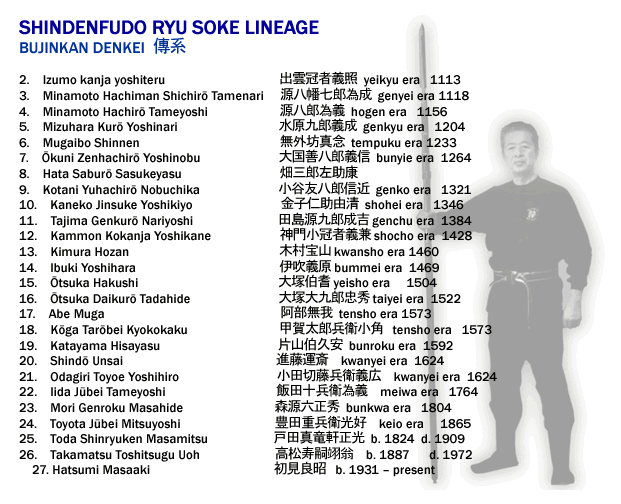
Shinden Fudo Ryu
History of Shinden Fudo RyuThe founder of this school, ‘Izumo’, learned Chinese Kempo boxing. Today some of this is still noticeable within the techniques.
Izumo Kanja Yoshiteru is also credited as being the founder of the Kukishinden Ryu Happo Hikenjutsu (Chapter 3).
Above the door of Toda’s dojo, there was a nameplate, which read “Shindenfudo Ryu Jutaijutsu”. In the dojo there was a set of rules displayed for all of the students to abide by.
These rules are from the Shindenfudo Ryu Densho and are listed as follows:
- Know wisdom of being patient during times of inactivity.
- Choose the course of justice as the path of your life.
- Do not allow your heart to be controlled by the demands of greed, ease, or pain.
- Sorrow, pain, and resentment should be regarded as natural qualities to be found in life. Therefore, work to cultivate an inmovable spirit (heart).
- Hold in your heart the importance of family loyalty, and aspire greatly for the ways of the pen and the sword with balanced determination.
Observing the 5 rules above is the law of the Dojo. Written at New Year, Meiji 23 (1891).
Toda Shinryuken Masamitsu
The secret principle of Shindenfudo Ryu is the “Principle of Nature”.
The Shindenfudo Ryu has
two styles of taijutsu:
Dakentaijutsu, and Jutaijutsu. In the Dakentaijutsu there are no formal kamae and the use of natural posture is emphasized, while in the Jutaijutsu there are 5 kamae.
The training levels in the Dakentaijutsu are:
- Ten no kata (8 kata)
- Chi no kata (8 kata)
- Shizen Shikoku no kata (12 kata)
The training levels in the Jutaijutsu are:
- Kamae (5 kamae)
- Shoden no kata (16 kata)
- Chuden no kata (11 kata)
- Okuden no kata (8 kata)
Hojojutsu is also taught in this Ryu-ha. It is used along side the taijutsu, to help restrain the opponent.
The school uses several different types of yari, ono (war axe), O-tsuchi (war hammers), and naginata.

